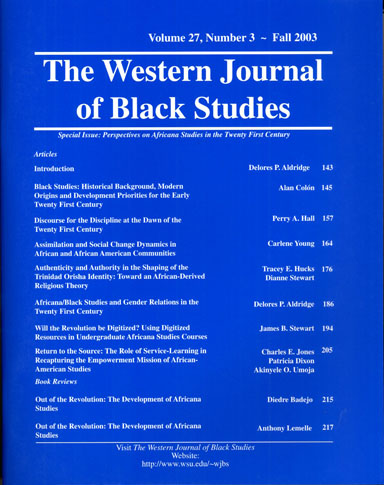Volume 27, Issue 3
Special Issue: Perspectives on Africana Studies in the Twenty First Century
Guest Editor, Delores P. Aldridge
Introduction
pp. 143-144
Black Studies: Historical Background, Modern Origins and Development Priorities for the Early Twenty First Century
Alan Colón
Launched in the mid-1960s, Black Studies is an extension of a centuries-old liberation activist-intellectual tradition in African American culture. This article examines the historical background, modern origins and significance of Black Studies. It explores pivotal issues in and prospects for the development of Black Studies in the 21" century.
pp. 145-155
Discourses for the Discipline at the Dawn of the Twenty First Century
Perry A. Hall
Selected areas of discourse seen as signficant for Black Studies scholars in the current age of global integration are explored. It is suggested that new studies of the Black Freedom Movement and of the implications of global crises are appropriate projects for current scholars and future scholars that emerging Black Studies graduate programs may produce.
pp. 157-163
Assimilation and Social Change Dynamics
in African and African American Communities
Carlene Young
The assimilation of African Americans and African national immigrants in Western societies have significantly impacted traditional value systems, family dynamics and structure, gender relationships, group identity and overall coping skills. The long-term significance and pervasive influences of these social change processes are analyzed from a socio-psychological and historical perspective.
pp. 164-175
Authenticity and Authority in the Shaping of the Trinidad Orisha Identity:
Toward an African- Derived Religious Theory
Tracey E. Hucks, Dianne M. Stewart
This article focuses on the roles authenticity and authority play in the shaping of Trinidad Orisha Identity and as such provides a significant discourse for 21 scentury Africana/Black Studies. It is maintained that African continental traditions manifest in Trinidad Orisha Identity constitute a familiar "culture of origin" for Black communities across the African diaspora that can serve as a major step toward an African-Derived religious theory.
pp. 176-185
Africana Studies and Gender Relations in the Twenty First Century
Delores P. Aldridge
There must be complementarity in gender relations in Africana Studies in the twenty first century for the continued survival healthy development of the discipline. Reasons for promoting gender equity are explored and common grounds for male and female scholars as well as external forces impinging upon the destiny of African peoples and their scholarship are presented.
Finally, strategies are offered for integrating black women into an Africana Studies curriculum.
pp. 186-193
Will the Revolution be Digitized? Using Digitized Resources in Undergraduate Africana Studies Courses
James B. Stewart
This analysis reviews selected Internet resources for possible use as supplemental resources in undergraduate Black/Africana Studies courses. It is argued that resources are available via the Internet that can, if used appropriately, provide new types of'opportunities for students to access and engage valuable information at no additional expense to instructors and students. A brief overview of selected efforts to develop basic Africana Studies instructional resources since the late 1960s is used to provide a context for the discussion. The original curriculum design for majors in Africana Studies developed by the National Council for Black Studies (NCBS) is used to suggest how selected digitized resources can be used effectively. The relationships among Internet-based resources and various computer-based digitized resources are discussed in the concluding section along with the importance of greater engagement by Africana Studies specialists in the development of additional digitized Africana Studies resources.
pp. 194-204
Return to the Source: The Role of Service-Learning in Recapturing the Empowerment Mission of African-American Studies
Charles E. Jones, Patricia Dixon, Akinyele O. Umoja
This essay focuses on the role of service-learning in operationalizing the "empowerment" or "social responsibility" mission of Africana Studies. In doing so, it provides an overview of the history and impact of service learning; offers a case analysis of the implementation; and, concludes with a discussion of the utility of service learning as a potential "empowerment exemplar of the Africana Studies discipline.
pp. 205-216
Book Reviews
Out of the Revolution: The Development of Africana Studies
Editors: Delories P. Adridge and Carlene Young
Reviewed By: Diedre L. Badejo

| The WJBS site is normally maintained by Tanya Gonzales. Please feel free to e-mail comments, queries, and suggestions. |
Heading using the h3 tag
Lorem ipsum dolor sit amet, consectetur adipisicing elit, sed do eiusmod tempor incididunt ut labore et dolore magna aliqua. Ut enim ad minim veniam, quis nostrud exercitation ullamco laboris nisi ut aliquip ex ea commodo consequat. Duis aute irure dolor in reprehenderit in voluptate velit esse cillum dolore eu fugiat nulla pariatur. Excepteur sint occaecat cupidatat non proident, sunt in culpa qui officia deserunt mollit anim id est laborum.